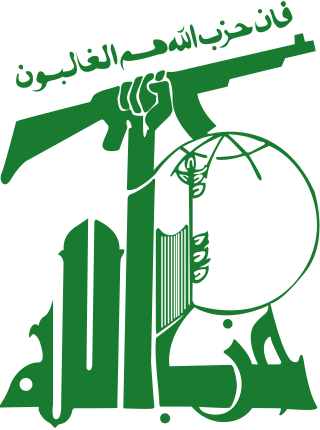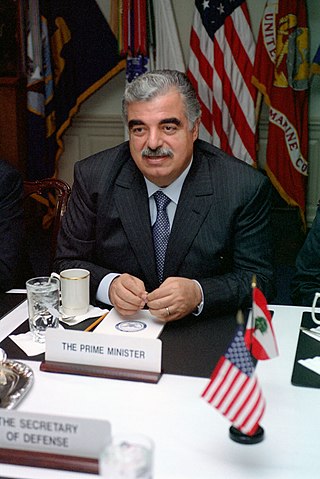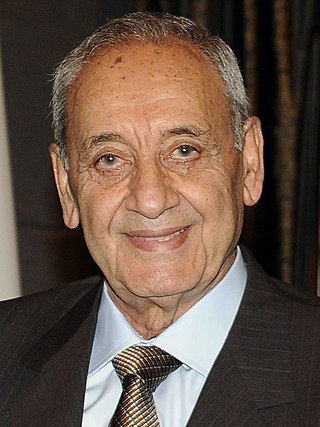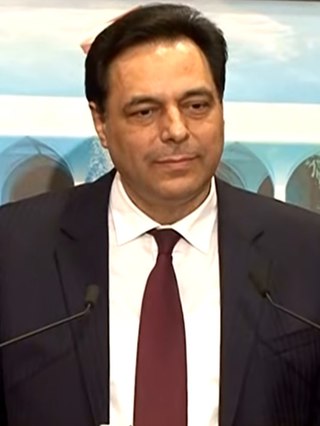Related Research Articles

Hezbollah is a Lebanese Shia Islamist political party and militant group,led since 1992 by its Secretary-General Hassan Nasrallah. Hezbollah's paramilitary wing is the Jihad Council,and its political wing is the Loyalty to the Resistance Bloc party in the Lebanese Parliament.

Lebanon,officially the Republic of Lebanon,is a country in West Asia. It is bordered by Syria to the north and east,by Israel to the south,and by the Mediterranean Sea to the west;Cyprus lies a short distance away from the country's coastline. Lebanon's location at the crossroads of the Mediterranean Basin and the Arabian hinterlands has contributed to the country's rich history and shaped a unique cultural identity denoted by religious diversity. Located in the Levant region of the Eastern Mediterranean,the country has a population of more than five million people and covers an area of 10,452 square kilometres (4,036 sq mi). Lebanon's capital and largest city is Beirut,followed by Tripoli and Jounieh. While Arabic is the official language,French is also recognized in a formal capacity;Lebanese Arabic is the country's vernacular,though French and English play a relatively significant role in everyday life,with Modern Standard Arabic being limited to news and government matters.

The economy of Lebanon has been experiencing a large-scale multi-dimensional crisis since 2019,including a banking collapse,a liquidity crisis and a sovereign default. It is classified as a developing,lower-middle-income economy. The nominal GDP was estimated at $19 billion in 2020,with a per capita GDP amounting to $2,500. In 2018 government spending amounted to $15.9 billion,or 23% of GDP.

Beirut is the capital and largest city of Lebanon. As of 2014,Greater Beirut has a population of 2.5 million,which makes it the third-largest city in the Levant region and the thirteenth-largest in the Arab world. The city is situated on a peninsula at the midpoint of Lebanon's Mediterranean coast. Beirut has been inhabited for more than 5,000 years,making it one of the oldest cities in the world.

Rafic Bahaa El Deen al-Hariri,or Rafiq al-Hariri,was a Lebanese business tycoon and politician,who served as the Prime Minister of Lebanon from 1992 to 1998 and again from 2000 until his resignation on 20 October 2004.

Nabih Berri is a Lebanese Shia politician who has been serving as Speaker of the Parliament of Lebanon since 1992. He heads the Amal Movement.

Michel Naim Aoun is a Lebanese politician and former military general who served as the President of Lebanon from 31 October 2016 until 30 October 2022.

Saad El-Din Rafik Al-Hariri is a Lebanese-Saudi politician who served as the prime minister of Lebanon from 2009 to 2011 and 2016 to 2020. The son of Rafic Hariri,he founded and has been leading the Future Movement party since 2007. He is seen as "the strongest figurehead" of the March 14 Alliance.

Abdul Halim Khaddam was a Syrian politician who served as interim President of Syria in 2000. He also was Vice President of Syria and "High Commissioner" to Lebanon from 1984 to 2005. He was long known as a loyalist of Hafez Assad until he resigned from his position and left the country in 2005 in protest against certain policies of Hafez's son and successor,Bashar Assad. He accumulated substantial wealth while in office:a Credit Suisse account,opened in 1994,was nearly 90 million Swiss francs in September 2003,per Suisse secrets.

The Lebanese people are the people inhabiting or originating from Lebanon. The term may also include those who had inhabited Mount Lebanon and the Anti-Lebanon Mountains prior to the creation of the modern Lebanese state. The major religious groups among the Lebanese people within Lebanon are Shia Muslims (27%),Sunni Muslims (27%),Maronite Christians (21%),Greek Orthodox Christians (8%),Melkite Christians (5%),Druze (5.2%),Protestant Christians (1%). The largest contingent of Lebanese,however,comprise a diaspora in North America,South America,Europe,Australia and Africa,which is predominantly Maronite Christian.

The 2006 Lebanon War,also called the 2006 Israel–Hezbollah War and known in Lebanon as the July War and in Israel as the Second Lebanon War,was a 34-day military conflict in Lebanon,northern Israel and the Golan Heights. The principal parties were Hezbollah paramilitary forces and the Israel Defense Forces (IDF). The conflict started on 12 July 2006,and continued until a United Nations-brokered ceasefire went into effect in the morning on 14 August 2006,though it formally ended on 8 September 2006 when Israel lifted its naval blockade of Lebanon. Due to unprecedented Iranian military support to Hezbollah before and during the war,some consider it the first round of the Iran–Israel proxy conflict,rather than a continuation of the Arab–Israeli conflict.

Najib Azmi Mikati is a Lebanese politician and businessman,and three-time Prime Minister of Lebanon whose current term began in September 2021. He also serves as the resigned prime minister of a cabinet that,when assembled with a majority of its members,acts as President of Lebanon for emergency situations,since the end of the term of president Michel Aoun in October 2022. He previously served as Prime Minister from June 2011,to February 2014,and from April to July 2005. He also served as Minister of Public Works and Transport from December 1998 to 2003.

Between 2011 and 2017,fighting from the Syrian civil war spilled over into Lebanon as opponents and supporters of the Syrian Arab Republic traveled to Lebanon to fight and attack each other on Lebanese soil. The Syrian conflict stoked a resurgence of sectarian violence in Lebanon,with many of Lebanon's Sunni Muslims supporting the rebels in Syria,while many of Lebanon's Shi'a Muslims supporting the Ba'athist government of Bashar Al-Assad,whose Alawite minority is usually described as a heterodox offshoot of Shi'ism. Killings,unrest and sectarian kidnappings across Lebanon resulted.

Hassan Diab is a Lebanese academic,engineer and politician who served as the prime minister of Lebanon from 21 January 2020 to 10 September 2021. He was appointed by President Michel Aoun in 2019 to succeed Saad Hariri as prime minister. He submitted his resignation on 10 August 2020 in wake of the explosion in Beirut and served as caretaker prime minister until Najib Mikati formed a new government on 10 September 2021. Prior to his premiership,he served as the minister of education from June 2011 to February 2014 under President Michel Suleiman.
Events in the year 2020 in Lebanon.

A new Lebanese cabinet led by Prime Minister Hassan Diab was formed in Lebanon on 21 January 2020,after agreement was reached by the heads of the involved political parties after nearly three months. The already delegitimized government assigned Diab and his new cabinet,despite ongoing public outrage against the new cabinet and citizen requests for a competent,independent,and technocratic government. The marketing campaign by the authoritative powers around the new cabinet were mired by obvious untruths such as Diab claiming to have met "representatives of the thawra" but turned out to be regime supporters or the regime using the term "techno-political" to describe the new cabinet in order to justify the majority partisan appointments. Diab was appointed prime minister by President Michel Aoun following the resignation of Saad Hariri following the 2019–20 Lebanese protests,that started in October 2019. On 10 August 2020,the government resigned following public anger over the 2020 Beirut explosions on 4 August but continues to govern as a caretaker government.

In Lebanon, the worldwide pandemic of coronavirus disease 2019 (COVID-19) caused by severe acute respiratory syndrome coronavirus 2 has resulted in 1,238,552 confirmed cases and 10,936 all-time deaths after COVID-19 was confirmed to have reached Lebanon in February 2020.

The Lebanese liquidity crisis is an ongoing financial crisis affecting Lebanon,that became fully apparent in August 2019,and was further exacerbated by the COVID-19 pandemic in Lebanon,the 2020 Beirut port explosion and the Russian invasion of Ukraine. The country experienced liquidity shortages in the years prior to 2019 but the full extent of the fragility of the economy were concealed through financial engineering by the governor of the central bank. Lebanon's crisis was worsened by United States sanctions targeting Syria's government and Iran-backed Hezbollah.

On 4 August 2020,a large amount of ammonium nitrate stored at the Port of Beirut in the capital city of Lebanon exploded,causing at least 218 deaths,7,000 injuries,and US$15 billion in property damage,as well as leaving an estimated 300,000 people homeless. A cargo of 2,750 tonnes of the substance had been stored in a warehouse without proper safety measures for the previous six years after having been confiscated by Lebanese authorities from the abandoned ship MV Rhosus. The explosion was preceded by a fire in the same warehouse.
Hamad Ali Hasan is a Lebanese academic and politician who has served as the Minister of Health in the Lebanese government from 21 January 2020 to 10 September 2021.
References
- ↑ "Who is in the new Lebanese government?". The National. 22 January 2020. Archived from the original on 26 February 2020. Retrieved 12 August 2020.
- ↑ "Beirut explosion: Lebanon's government resigns as public anger mounts". BBC News . August 10, 2020. Retrieved August 10, 2020.